#cook:にんじん
Explore tagged Tumblr posts
Photo

✿ 筑前煮 ✍️ 油なし,白ワイン,砂糖大1,醤油大2,みりん大1,いんげん
#cook:筑前煮#cook:根菜#cook:2025〜 cook#cook:主菜#cook:鶏もも肉#cook:主菜:鶏もも肉#cook:こんにゃく#cook:ごぼう#cook:酒×砂糖×醤油×味醂#cook:いんげん#cook#2025〜#cook:にんじん#cook:れんこん
0 notes
Text

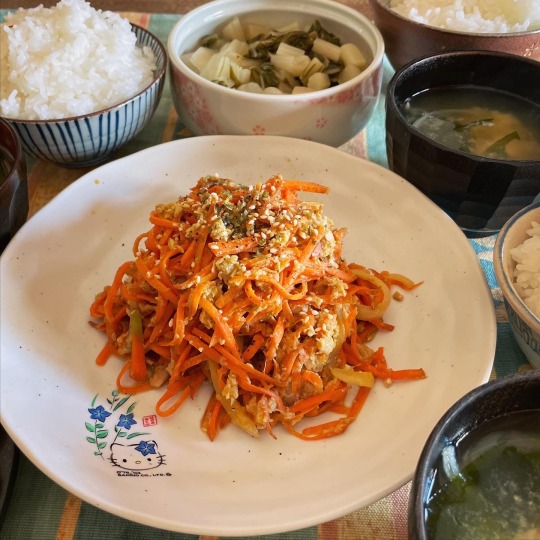
にんじんしりしりと茹で豚醤油漬け
7 notes
·
View notes
Text

こふく:通称こふ、こふちゃん、稀にこふたん、こふたろう、こふくさん、別名脅威の黒猫
2022年7月、約2ヶ月半で保護施設から引き取られた。脱肛しており長くないかもと言われていたが、無事改善しすくすく育つ。
Jさんに日々挑みかかる強気な幼少期を送るも実は怖がりで、たまのお客さんはおろかじいちゃんにすら挨拶したことがない内弁慶。
だっこを嫌い、呼べば逃げ、最近は何を考えているか分からない顔で床に落ちており、家主ですら意思疎通は困難。しかし朝家主が目覚めると枕シェアによる寄り添いサービスを行っており、一定の愛情はあるもよう。
米をこよなく愛し、炊きたてご飯や準備中の餅米をむしゃむしゃと食べる。また物理的に我が道を行くため多くの物を壊し、実はかなり家主に散財させている。
Kofuku: known as Kofu, Kofu-chan, rarely Kofutan, Kofutaro,or Kofuku-san, and the alias is the black menace
He was adopted from the animal shelter when he was around 2months and a half. Although it was said he might not live so long because he had the anal prolapse, now he has no problems and has gotten so big.
He had a violent childhood attacking Mr.J every day, but his nature is only a home tiger so he can't greet with not only her guests but grandpa yet.
He hates being hugged, runs away when she calls him, and falls on the floor with the face that doesn't know what he's thinking these days, so it's still impossible for landlady to communicate with him. She can feel his affection only by his staying beside service with sharing her pillow when she wakes up.
He loves rice SO much and eats cooked rice or prepared mochi rice. And he always goes his way physically,then broke a lot of things at home so he let her spend quite an extra money...
5K notes
·
View notes
Text
Compliments in Japanese
How do you give compliments in Japanese? Japanese tends to be a very 曖昧 (あいまい) or vague language, so direct compliments tend to be less common.
お世辞 おせじ compliment
誉め言葉 ほめことば compliment, praise
Here are some compliments that can be used in most situations.

Appearance・見た目
Polite 髪の毛切りましたか?似合いますね。 かみのけきりましたか?にあいますね。 Did you cut your hair? It looks good on you.
Casual 髪の毛切った?似合うよ。 かみのけきった?にあうよ。 Did you cut your hair? It looks good.
Polite そのシャツ/ワンピース/服いいですね。 そのシャツ/ワンピース/ふくいいですね。 That shirt/dress/outfit looks good.
Casual そのシャツ/ワンピース/服いいね。 そのシャツ/ワンピース/ふくいいね。 That shirt/dress/outfit looks good.
Polite いい笑顔ですね。 いいえがおですね。 You have a nice smile.
Casual いい笑顔だね。 いいえがおだね。 You have a nice smile.
Work・仕事
Polite 良くやりましたね! よくやりましたね! Good job! / Well done!
Casual 良くやったね! よくやったね! Good job! / Well done!
Polite お見事です! おみごとです! Great work! / Excellent!
Casual お見事! おみごと! Great work! / Excellent!
Polite 今日のプレゼン/スピーチ/アイディアとても良かったです。 きょうのプレゼン/スピーチ/アイディアとてもよかったです。 Today's presentation/speech/idea was very good.
Casual 今日のプレゼン/スピーチ/アイディアとても良かったよ。 きょうのプレゼン/スピーチ/アイディアとてもよかったよ。 Today's presentation/speech/idea was very good.
Skill・腕前
Polite 料理上手ですね。 りょうりじょうずですね。 You are good at cooking.
Casual 料理上手いね。 りょうりうまいね。 You are a good cook.
Polite 写真を撮るセンスがいいですね。 しゃしんをとるセンスがいいですね。 You have good photography sense.
Casual 写真を撮るセンスがいいね。 しゃしんをとるセンスがいい��。 You have good photography sense.
Polite 英語がペラペラですね。 えいごがペラペラですね。 Your English is very fluent.
Casual 英語がペラペラだね。 えいごがペラペラだね。 Your English is very fluent.
#日本��#japanese#japanese langblr#japanese studyblr#langblr#studyblr#compliments in japanese#japanese language#tokidokitokyo#tdtstudy
313 notes
·
View notes
Text

Kokoro Asano 浅野こころ
Profile
年齢 /age:21
身長 /height:156cm
スリーサイズ /BWH:B83(E) W59 H85
趣味 /hobby:料理 Cooking
黒髪の清楚な美少女ルックスのニューヒロイン!「浅野こころ」ちゃんの撮り下ろしグラビアを公開!ナチュラルビューティな可愛い顔に大きな瞳!形の良いEカップ美乳にウエストが締まった色白美肌のスレンダーボディが眩しい!「浅野こころ」ちゃんの撮り下ろしヌードグラビアをじっくりとお楽しみください!
A new heroine with black hair and a neat beautiful girl look! Newly taken gravure of "Kokoro Asano" released! Natural beauty, cute face and big eyes! Her slender body with well-shaped E-cup breasts, tight waist and fair skin is dazzling! Please enjoy the newly taken nude photos of "Kokoro Asano"!!
179 notes
·
View notes
Note
Hi YuuRei! I just have a question because I do have a hard time finding it due to not being able to read Japanese but I remember on YouTube there was a video somewhere with two TWST VAs (one of them i think was Rook?) doing a cooking show where they cooked Jade's chef event tofu hamburger and Silver's meat stew and have Rook's VA taste test it and I was wondering that if it was real or not? Thank you so much!
Hello hello! ^^ Thank you for this question!
It was real! It was an installment of Crewel's VA Ito Kent's "Good Boy!" series for the Disney Games channel!
There do not seem to be videos of the VAs themselves cooking Jade's chef event tofu hamburger with a taste-testing of Silver's stew available anymore, but the cooking of the hamburger and stew are there!
Tofu hamburger here!
youtube
Meat stew here!
youtube
If you are interested more in "VAs cook and then eat" videos, we have Crewel's Ito and Cater's Kobayashi both preparing and tasting Cater's potato galette dish and Idia's stuffed bell peppers!
Potato Galette here!
Stuffed Bell Peppers here!
If you are more interested in just the how-to cooking of those dishes without VA involvement they are available here (potato galette) and here (stuffed bell peppers).
And those are all the cooking episodes available!
If you are super sure that you saw a video once of Rook's VA tasting the dishes--you are right 👀
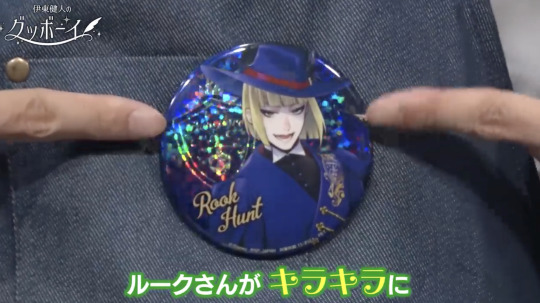
As seen above, two of the videos available are listed as #18 and #19, and yet there are only 12 videos available in the "Ito Kento's 'Good Boy!'" playlist. Rook's VA Itokawa's appearances in episodes #7 (Twst Gourmet: Beef Stew) and #8 (Twst Gourmet: Tofu Hamburger) are no longer viewable!
This is because the official Disney Games YouTube Channel will regularly delete its videos. I am not sure why, but maybe something related to VA appearances? (Most of the VAs come from different agencies, we have no way of knowing the content of one person's contract vs. the content of another's, and I have heard it is all very complicated!)
There used to be a lot more available, such as appearances by Rook's Itokawa, Floyd's Okamoto, Azul's Tamaru, etc. (clips of which can be seen in this compilation video), but videos like Azul's Tamaru hosting an entire episode about keychains, another about Octavinelle rhythmics and a third about Azul's English localization are now gone :<
74 notes
·
View notes
Note
I wanted to ask you this since your post about bishies haha because it remind me how there is not a discussion about how female characters are or look unrealistic compared to how unreal anime men in media aimed at women are or look, in fact there is not a distinction in how women are physically portrayed in media aimed at men or media aimed at women.
Do you think there is a reason for this? I mean the distinction of something ‘good and realistic’ vs bl?
I don't watch TV dramas, but an artist I follows rtd this; 「東京サラダボウル」在日外国人の人々への偏見を解くだけでなく、警察内部でのゲイカップルの存在を真���に描いていて驚く。BLや笑いに逃げず、極端なラブシーンを描かずともちょっとした触れ合いで2人の関係性が如実に伝わって来る演出がリアルでいい。日本のドラマで今まで無かったんじゃないか?
And I don't know if the translator is betraying me, but I think the person is praising how drama doesn’t ‘run away with BL or laughter’ and I suppose it refers to the fact that the drama is not trying to appeal to a BL ¿fanbase, aesthetic? but a realistic one.
I know that BL does not reflect gay life realistically, but it's interesting? how a praise for gay dramas (or even for BL mangas) is how separate they feel-are from the genre.
I ask mostly because this type of sentiment is not something I see people who like yuri or straight romance bring up At All.
The ‘Realistic Homosexual Relantionship’ tag on Baka Updates is 90% BL mangas, works like Hanamonogatari or She loves to cook She loves to eat doesn’t have it.
Finally this is just pure hatred but it’s really infuriating how men(and women) into bara will make fun of women for being into bishies but they themselves are solely into moe, lolis or bishoujos and have 0 interest in looking for art with female characters who look realistic.
oh we're not doing all that!
the reason for the "good wholesome realistic media VS oohh evil gooners having unrealistic fantasies" debate is that vanilla people always want to act morally superior for being vanilla. it's not deep.
we're all drooling n panting at cartoon drawings so i think everyone need to humble down a little. this also includes girlies who like yoi and kuroshit somehow thinking they're morally superior to straight male otakus btw. it goes both ways.
i personally don't care for "realistic" BL. it doesn't mean it's better or worse than the BL i personally like, it's just not for me.
tl;dr anyone who act judgemental of someone else's preferences is lame and insecure

#to be perfectly honest. as a gay man who's not into bara & with plenty of non-straight fujoshi women in my circle#i get so weary of any debate using the completely inaccurate representation of the BL fanbase as#“het women who like bishies and gay men who like gengoroh tagame. and that's IT”
14 notes
·
View notes
Text
食材の多い料理店
The Restaurant of Many Ingredients (Much Meat)
全身白髪だらけだと
As he strokes his red crest,
赤いとさかを撫でな��ら
Fry Kitchen grumbles that he's covered
フライ・キッチンがぼやく
Head to toe in white hairs
石臼での粉挽きなど
This is the first time in his life
生まれて初めて 昔は
That he's ever ground flour with a stone mortar
そんな身分じゃなかった
This hadn't been his standing in life in the past
.
屍用人に身を落としても
Though he'd stooped to the position of undead servant
家畜の姿に変わっても
Though his form had changed to that of livestock
意外と気分は悪くない
It actually isn't all that bad
今になって気がついたのさ
It was now that he realized
机に積まれた札束など
That stacks of money piled up on a desk
何の意味も無かったんだと
Don't really mean anything
.
肉の焦げた匂いが漂う
The smell of charred meat wafts through the air
次は自分じゃない事を祈る
He prays that he isn't next
.
ずっとうんざりしてたのさ
He'd always been so bored and fed up
23人の兄弟ども
So he finally bid farewell
ようやく別れを告げて
To his 23 siblings
ポーク・チョップは独立した
Pork Chop had set out on his own
嬉しい事のはずなのに
This should have been a happy thing
何故だか少し寂しい
But somehow it was a little lonesome
.
鼻を鳴らして野菜を切る
He cuts vegetables while snuffling and snorting
刃物の扱いは慣れたものさ
He's gotten used to holding a knife
何人も刻んできたから
Since he's chopped up countless people
希代の始末屋だったのに
He'd once been uncommonly stingy
今じゃのろまの従兄弟にさえも
But nowadays he can't even hold a candle
頭があがりゃしないのさ
To those blockhead cousins of his
.
熊の瞳がこっちを見ている
The bear's eyes are looking his way
獲物が自分じゃない事を祈る
He prays that he's not its prey
.
憧れのあの方にならば
Chateau Briand had declared that
食べられても構いませんわ
As long as it was by the one he admired
シャトー・ブリアンは言い切った
He wouldn't mind being eaten
あの日話しかけられなくて
He hadn't been able to speak to them that day
助ける事が出来なかった
And so couldn't save them
後悔は今も残る
His regrets linger even now
.
16人目のコックになる
He'd become the 16th cook
決意して門をたたいたけど
Though he had mustered his will and applied for an apprenticeship
既に屋敷はもぬけの殻
The mansion was already an empty husk
今ではもうあの時とは
And now everything
全てが変わってしまったけど
Is different from the way things were then
変わらないものだってあるの
Yet there are some things that haven't changed
.
けだるげな赤猫をみかける
He spies a listless looking red cat
自分のお腹の肉をなでる
It pats the meat of his belly
.
たどたどしい手つきの料理
I wordlessly gaze upon
行う弟子たちの姿を
The sight of my pupils
俺は無言で眺める
Carrying out their clumsy cooking technique
昔のことなど忘れた
I've forgotten most of my past
それでもこの調理場には
Even so, this kitchen
懐かしい匂いがする
Has a scent that brings back memories
.
誰かと旅をし料理をする
To go traveling with someone, and make food with them,
それがかつて自分が望んだ
Wasn't that the life that I had once
生活だったのだろうか
Wished to have?
店をにぎわす異界の客
These guests from the parallel world bustling through the restaurant,
彼らのために用意された
I reach for the new ingredient
新たな食材を手に取る
That I've prepared for them
.
幸せの花は赤く綺麗で
The flower of happiness is a lovely red
メインディッシュのスパイスに最適
It'll be a perfect spice for the main dish
.
再び弟子たちに目をやる
Again he looks towards his apprentices
選ばなければならない
He'll have to select
メインディッシュの食材を
The main ingredient for the main dish
不足で困る事は無い
He isn't lacking in choice
ここはとても食材の多い
This is Mister Dog's restaurant
ミスター・ドッグの料理店
Of many ingredients
30 notes
·
View notes
Text
Memo for Episode 11 (Ep.35) “The Hunt”
馬閃(バセン)「茘(リー)、という国名(こくめい)は、その一文字(ひともじ)で、建国(けんこく)の物語(ものがたり)を表(あらわ)している。草(くさ)の下(した)に三(みっ)つの刀(かたな)…。草��華(はな)、帝(みかど)の先祖(せんぞ)である王母(おうぼ)を指(さ)し、その下の三つの刀は王母を助(たす)けた三人(さんにん)の武人(ぶじん)を示(しめ)す。三つの刀のうち、下二(ふた)つに比(くら)べて大(おお)きい刀は、北(きた)の大地(だいち)・子北州(しほくしゅう)を指(さ)す。子北洲一帯(いったい)は、高粱(コーリャン)や麦(むぎ)を栽培(さいばい)していて、さらに北に行(い)くと、山岳地帯(さんがくちたい)が広(ひろ)がり…て、聞(き)いてるのか!?」
Basen “Rī, to-iu koku-mei’wa, sono hito-moji’de, kenkoku’no monogatari’o arawashite-iru. Kusa’no shita’ni mittsu’no katana… Kusa’wa hana, mikado’no senzo-de-aru Obo’o sashi, sono shita’no mittsu’no katana’wa Obo’o tasuketa san-nin’no bujin’o shimesu. Mittsu’no katana’no-uchi, shita futatsu’ni kurabete ookii katana’wa, kita’no daichi, Shi-Hoku-shu’o sasu. Shi-hoku-shu-ittai’wa, kōryan’ya mugi’o saibai-shite-ite, sarani kita’ni ikuto, sangaku-chitai’ga hirogari…te, kiiteru-noka?!”
Basen “The character used to write the name of our nation, ‘Li,’ also depicts the story of its founding. Three swords under grass. ‘Grass’ is for ‘flower,’ representing the Mother Royal, ancestor of the emperor. The three ‘swords’ under it represent the three warriors who helped her. Of the three swords, the one larger sword represents the Shihoku-shu, the northern lands. That entire area grows sorghum and wheat. If you go further north, you enter a mountainous region… Hey, are you listening?!”
In this line, Basen explained the Kanji “茘(リー)” in detail. For your better understanding, please see below.

――――――――――――――――――――――――――――――
馬閃「何でこんな娘を父上(ちちうえ)は…」
Basen “Nande konna musume’o chichi-ue’wa…”
Basen “Why does my father care so much about this girl?”
The fact that he said this to her shows how young and immature he is, although she is also at fault for dozing off while listening to his explanation.
――――――――――――――――――――――――――――――
猫猫(はて?)「何(なに)か、変(か)わった趣向(しゅこう)でも?」
Maomao (Hate?) “Nanika, kawatta shuko’demo?”
Maomao (Huh?) “Is this some kind of strange rule?”
趣向(しゅこう/Shuko): There seems to be no word which directly refer to it in English… Idea, plan, or taste is used depending on the context.
趣味・趣向(しゅみ・しゅこう) is sometime used in Japanese. 趣味(Shumi) is “hobby”. For example, let’s say I have a hobby of Karaoke and I have a karaoke party with my friends once a month. And I say 「来月は趣向を変えて、コスプレでアニメソングのカラオケパーティをしよう!」. It means “Next month, let’s do something different and have a cosplay karaoke party singing anime songs!” In this case, 趣味(Shumi) is “hobby: karaoke”, and 趣向(Shuko) is “how we enjoy karaoke: cosplay and sing anime songs”. So I guess I can say 趣向(Shuko) is an idea to enjoy something based on your taste.
The word is also used in the following line later;
猫猫(狩りは、宿(やど)から30分(さんじゅっぷん)馬(うま)に揺(ゆ)られ、徒歩(とほ)で一時間(いちじかん)山(やま)を登(のぼ)った高台(たかだい)で行(おこな)われる。お偉方(えらがた)が捕(つか)まえた獲物(えもの)をその��(ば)で調理(ちょうり)するという趣向(しゅこう)のようだ)
Maomao (Kari’wa, yado’kara sanjuppun uma’ni yurare, toho’de ichi-jikan yama’o nobotta taka-dai’de okonawareru. Oera-gata’ga tsukamaeta emono’o sono-ba’de chori-suru-to-iu shuko’no-yoda.)
Maomao (The hunt takes place at a location half an hour away by horse, and then one hour up the mountain by foot. It seems like the point of the event is to cook the game caught by the nobles on the spot.)
――――――――――――――――――――――――――――――
猫猫「そうですか…」(やっぱり壬氏様はいいとこの出(で)なのか…うん、うん)
Maomao “So-desuka…” (Yappari Jinshi-sama’wa ii-toko’no de nanoka… Un, un.)
Maomao “I see.” (So Master Jinshi is from a good family, after all.)
いいとこ(ii toko): good family, good place = いい所(ところ/tokoro)
The word is also used in the following line later;
李白「こんにちは?あ~!嬢(じょう)ちゃんか!どうしたんだ?こんなとこで」
Rihaku “Kon’nichiwa? Aaa! Jochan-ka! Do-shitanda? Konna toko’de.”
Lihaku “Hello? Hey! Little miss! What are you doing all the way out here?”
――――――――――――――――――――――――――――――
高順「小猫は例(れい)のことを何一(なにひと)つ知(し)らない」
Gaoshun “Shaomao’wa rei’no koto’o nani-hitotsu shira-nai.”
Gaoshun “Xiaomao knows nothing about it.”
例の(れいの/Rei’no): the, that, it
This word is used in situations where the speaker and listener know what it refers to, or when they feel embarrassed to say it directly. It enables you to speak without a third party being able to understand.
The word is also used again in the following line later;
男1「これが例(れい)の…随分(ずいぶん)小型(こがた)だな」
Otoko-Ichi “Korega rei’no… zuibun kogata dana.”
Man-1 “Is this it? It’s quite small.”
――――――――――――――――――――――――――――――
猫猫「はぁ。もともと壬氏様のお食事(しょくじ)です」
Maomao “Haa. Moto-moto Jinshi-sama’no oshokuji desu.”
Maomao “Well, it’s your food, after all.”
はぁ(Haa): casual and broken way of saying “はい: Yes”. It shows that Maomao is questioning why he asks such a question. Otherwise “はぁ” may be considered a rude response.
もともと(Moto-moto): originally
壬氏「本���にいいのか?!」
Jinshi “Honto’ni ii-noka?!”
Jinshi “Are you absolutely sure?”
Maomao has no idea why he’s asking so emotionally, but you all do, maybe. His condition is already not good at this point, and he seems to be unable to control his emotions.
――――――――――――――――――――――――――――――
壬氏「ああ。むしろ食え」
Jinshi “Aa. Mushiro kue.”
Jinshi “Yeah. In fact, I order you to.”
むしろ(Mushiro): rather
むしろ+命令形(めいれいけい/Meirei-kei: instruction form): Or rather, do it.
――――――――――――――――――――――――――――――
猫猫「なぜと言われましても…そういう体質(たいしつ)ですから」
Maomao “Naze-to iware-mashitemo… So-iu taishitsu desu-kara.”
Maomao “All I can say is that’s just how I’m built.”
体質(たいしつ/Tai-shitsu): constitution, physical makeup
――――――――――――――――――――――――――――――
猫猫(お若(わか)いとは大変(たいへん)である)
Maomao (Owakai-towa taihen’de aru.)
Maomao (It’s not easy being young and vigorous.)
If I translate it directly, it will be “It is tough to be young.” But Maomao’s way of saying is suggestive, such as “お若い” instead of “若い” even though it’s not necessary to add “お”(Keigo, honorific) for Basen in her monologue. And also judging from the context, we can understand that “…and vigorous” is hidden in her line.
――――――――――――――――――――――――――――――
猫猫(湯(ゆ)あみまでできるとは…贅沢(ぜいたく)だなぁ…。明日(あした)は狩りか…。つつがなく終(お)わるといいけど)
Maomao (Yuami-made dekiru-towa…zeitaku-danaa… Ashita’wa kari-ka… Tsutsuga-naku owaru-to ii-kedo.)
Maomao (A bath, too? How extravagant. The hunt starts tomorrow. I hope it goes without incident.)
つつがなく(Tsutsuga-naku): formal word which means safely, well, without any incident/trouble.
――――――――――――――――――――――――――――――
男1「ここで、あの方には死んでもらう」
Otoko-Ichi “Koko’de, ano kata’niwa shinde-morau.”
Man-1 “This will be where they die.”
方(かた/Kata): It’s like a Keigo of “人(ひと/Hito): person”, same as “お方(おかた/Okata)”. With “お” or without, it means honorific feeling to the person. And if it means more than two people, 方 becomes “方々(かたがた/Kata-gata)”, so this 方 only refers to the single person: Jinshi. I wonder why they translated it as “they”, which could lead viewers to mistakenly believe that Maomao was also a target. If I were to translate it, I would use “that gentleman.”
死んでもらう(しんでもらう): It's hard to translate this expression into English. ~してもらう means “have someone do” and maybe “Here, (is the place where) that gentleman shall die (for us).” would be my direct translation. In Japanese, such expressions are often used, especially in movies or games, just before someone is going to kill the other person, as a softer way of saying.
This line can be more polite, if you change もらう to いただく: ここで、あの方には死んでいただく.
――――――――――――――――――――――――――――――
猫猫「ちょっとご指名(しめい)があったもので」
Maomao “Chotto goshimei’ga atta-mono’de.”
Maomao “I was asked to join.”
指名する(しめいする/Shimei-suru): ask for a certain person, appoint, designate
――――――――――――――――――――――――――――――
猫猫(李白様も指名を受(う)けたのはいいが、地方出身(ちほうしゅっしん)の身(み)。他(ほか)の気位(きぐらい)の高い護衛たちに、追(お)い出(だ)された口(くち)だろう。最近(さいきん)どんどん出世(しゅっせ)しているようだが、その分風当たりは強(つよ)くなる)
Maomao (Rihaku-sama’mo shimei’o uketa-nowa iiga, chiho-shusshin’no-mi. Hoka’no kigurai’no takai goei-tachi’ni, oidasareta kuchi daro. Saikin don-don shusse-shite-iru-yodaga, sono-bun kaze-atari’wa tsuyoku-naru.)
Maomao (Master Lihaku got invited to join too, but he’s from the countryside. The other prideful guards must have pushed him out. He seems to be climbing the ranks recently, but that does tend to be met with resistance.)
~口(くち)だ(~kuchi da): be one of those who~
気位の高い(きぐらいのたかい/Kigurai’no takai): have lots of pride, prideful
風当たりが強い(かぜあたりがつよい/Kaze-atari’ga tsuyoi): windy, windswept, receive harsh treatment, greatly criticized
――――――――――――――――――――――――――――――
猫猫(避暑地(ひしょち)とはいえ、今日(きょう)は天気(てんき)も良(よ)く暑苦(あつくる)しい。快適(かいてき)に過(す)ごすのも一苦労(ひとくろう)だな…。…こんな暑苦しいのに、ずっと覆面(ふくめん)をつけて…料理(りょうり)にも手(て)を付(つ)けないつもりか?どんなに怪(あや)しい覆面姿(ふくめんすがた)でも、上座(かみざ)に座(すわ)っていれば、この中で一番(いちばん)の上客(じょうきゃく)ということなのだろう)
上座(かみざ/Kami-za): the top seat of honor, upper seat ⇔ 下座(しもざ/Shimo-za): the bottom seat, lower seat
I don’t know how it is in China, but in Japan, there are usually 上座 and 下座 in each room, and the guests are guided to 上座. Normally, 上座 is located at the farthest from the door/entrance, and 下座 is at the closest. It depends on each room, and even if it’s not the farthest from the entrance, the seat near the 床の間(とこのま/tokonoma) alcove or one with a good view may be the 上座.
――――――――――――――――――――――――――――――
猫猫(あれが楼蘭妃(ロウランひ)の父(ちち)、子昌様。子北洲の長(おさ)で、この狩りの主催者(しゅさいしゃ)だ。…ん?何か言われたのか?…いや、あのやたら外面(そとづら)のいい宦官が、あんなあからさまな態度(たいど)を取(と)るだろうか…。もしかすると、この暑さのせいで…)
Maomao (Are’ga Roran-hi’no chichi, Shisho-sama. Shi-Hoku-shu’no osa’de, kono kari’no shusai-sha-da. …N? Nanika iwareta-noka? …Iya, ano yatara soto-zura’no ii kangan’ga, anna akarasama-na taido’o toru-daroka… Moshika-suruto, kono atsusa’no sei’de…)
Maomao (That’s Master Shishou, Concubine Loulan’s father. He is the leader of the Shihoku-shu region and the organizer of this hunt. Hmm? Did he say something to him? Would that infinitely well-mannered eunuch show such an obvious attitude? Wait, could it be, because of the heat…)
外面のいい(そとづらのいい/Soto-zura’no ii): looks nice outside (but…)
It’s usually used in a negative sense, like “彼は誰にでも外面はいいが、家族には横柄だ(かれは、だれにでもそとづらはいいが、かぞくにはおうへいだ : He looks so nice with everybody outside, but he’s arrogant towards his family.”
あからさまな(Akara-sama-na): obvious, bald, bare, blatant
It’s also usually used in a negative sense, like “彼女はあからさまに私に意地悪だ(かのじょは、あからさまにわたしにいじわるだ/Kanojo’wa akara-sama-ni watashi’ni iji-waru da : She’s obviously mean to me.”
――――――――――――――――――――――――――――――
壬氏「自分でやる!お前のも���(か)せ。俺の方(ほう)が力(ちから)があるだろう」
Jinshi “Jibun’de yaru! Omae’nomo kase. Ore’no-hoga chikara’ga aru-daro.”
Jinshi “I’ll do it myself. Give me yours, too. I’m stronger than you.”
猫猫「はあ」
Maomao “Haa.”
Maomao “Yes.”
Here is はあ instead of はい again, which shows Maomao is wondering why his mood seems worse. I think they just translated it as “yes”, because replacing by “yeah” or something would sound too rude.
猫猫(良かった…さっきより体調(たいちょう)は良さそうだ。機嫌(きげん)は悪(わる)そうだけど)
Maomao (Yokatta… Sakki-yori taicho’wa yosa-soda. Kigen’wa waru-soda-kedo.)
Maomao (Good, he looks healthier than earlier. His mood seems worse, though.)
It’s interesting that Maomao has no idea about his behavior, in spite that he’s just embarrassed.
―――――――���――――――――――――――――――――――
猫猫「粗末(そまつ)な物(もの)で申(もう)し訳(わけ)ありませんが、食(しょく)していただけますか」
Maomao “Somatsu-na mono’de moshi-wake ari-masen-ga, shoku-shite-itadake-masu-ka.”
Maomao “I know it isn’t much, but would you like to eat any of this?”
粗末な物(そまつなもの/Somatsu-na mono): something shabby/poor/simple
That is a standard phrase to humble, which is used when giving a present in Japan, but in this case Maomao is saying that because butterbur is just a vegetable and it’s not something gorgeous.
~していただけますか(~shite-itadake-masuka): Would you mind if~? Could you~, please? Would it be possible to~?
Although they translated it into “would you like~,” I feel something is off a bit. I think “I’m afraid it’s just something simple, but could you please eat this, please?” is better, because she is not asking him if he’ll eat it, and actually, she’s asking him to eat it.
――――――――――――――――――――――――――――――
I’m sure you all thought “Don’t end here!” The incident where he jumped into the waterfall wasn’t in the original web novel, so when I read this in the light novel first, I was so surprised and thought “What? What’s going on?!” I’m really looking forward to the next episode, but I’m also a little worried, because some online and YouTube posts have overemphasized the sexiness of the scene. (Sorry, it might be the opposite of what you expect!) Anyway, let’s enjoy the next episode together!
#apothecary english#apothecary romaji#the apothecary diaries#apothecary diaries#learning japanese#japanese#薬屋のひとりごと#薬屋のひとりごと 英語#薬屋 英語 学習#japan#KNH#season 2
8 notes
·
View notes
Note
Ok, you mentioned Akai Shuichi dating/being the sugar baby of the Kudos in a reblog notes, give me the details please as I also have believed in that theory for the past goddamn three years but had no one else to talk to about it
HI. Hello friend (we are now friends automatically because of this). Sorry it took me [checks watch] 2 weeks to reply, I have very low spoons even on things I am VERY EXCITED ABOUT, and then @soveryanon was planning anyway to make this post soon so I decided to wait until she did bc I knew she would lay down all the touchpoints from canon.
So, all that! ^ We both p much share the same headcanons on this, but to babble on:
I firmly believe the Kudous are open/swingers/polyamorous, in general. (Hello Vermouth, Touichi, idk if Yukiko has managed to convince Eri bc it doesn't seem like Eri's thing but she would certainly love to, etc.) I know that canonically they fight or get jealous sometimes about the other flirting with other people, but look, first of all we can do what we want, secondly, that's not even a hard canon-incompatibility anyway, polyamorous relationships can have established rules and boundaries and (re)negotiations and their versions of cheating or jealousy too. Maybe Yukiko was just mad that one time bc Yuusaku had been hitting on an ex of hers while drunk, that doesn't mean they don't have threesomes all the time.
I think Akai is casually polyamorous, too. I know he canonically said that thing about not being able to love 2 women at once, bUT, bc the exact sentence in jpn is "二人の女を同時に愛せるほど器用な性分じゃないんでね", and 器用な means "skilled/skillful" and generally seems to be a very positive word. I like to take it as in Akai thinks it takes a lot of skill, you gotta be good to manage that.
~3+ years later and some practice with an experienced polyamorous couple he is now that good --
Alternately, since yes the original sentence is specifically about 2 women, you could make the joke that oh but 1 woman and 1 man at the same time is fair game tho. That'd be his sort of deadpan humour, I think.
Also and on the same sort of line of thinking: I have a lot of thoughts and feelings about Akai's emotions and love life. I can easily see him as happily and casually aroace who likes people and likes dating and likes having sex, as a way to connect and have intimacy with people. I also like to see him as a type of demiromantic that is just a total bleeding heart, who keeps falling in love the second he gets too close and knows it and knew he was gonna fall for Akemi for real if he did this seriously.
All this being said, I don't think he's in love with the Kudous, and vise versa. It's a casual, light-hearted, really nice and really affectionate thing stemming from genuine interest and respect, and there may well be flowers and candle-lit baths involved, and Yuusaku might instant-click with Akai nearly as well as Shinichi does, but it's not a romantic soulmates thing. It's just that in all my different possible views of Akai's love life, I think he just really likes people and having relationships (of any sort of manner) with people. (He's often characterised as a sullen loner but that is NOT true, he's surrounded with people constantly as Subaru, he chitchats easily with people, he visits the neighbour, he cooks for kids!!)
The absolute intimacy inherent to so much of the original set-up of "Subaru". The fact that Yukiko must be touching his face and hair all the time for the disguise, that this is how they met (since Akai doesn't seem to remember the beach incident).
That Yuusaku accepted to let his wife go every couple weeks to do this, multiple times, for a man he's never met, when Yukiko clearly came back GUSHING about the guy, when as I said above we know the teasing about checking out/flirting with other people is a big thing they squabble about -- that's so freaking huge, even keeping in mind that the canon prrrobably? isn't intending to hint that Yuusaku wouldn't mind his wife banging that younger man?
That Yuusaku DISGUISED AND ACTED as this man? whom he's apparently still never met at that point (could be a lie to Bourbon but who knows!!)?? but whom his son and wife really like??
The fact that Yuusaku wrote and published an entire thing about this man. Whom he's apparently never met. Just from hearing Yukiko (and maybe Shinichi? doubt.jpg) talk about him. Not only that, but wrote super fast considering the fucking timeline of DetCo lmao, and it was his first time writing a screenplay so Akai inspired him to do something entirely new, not something any of his editors would have been hounding him about (in fact, likely odds that his editors would have been screaming why and wanting him to do something else like a new book of his established series). And it was immediately picked up and made into a movie!!
And won an award!!
And Yuusaku skipped on attending that ceremony himself -- his first award for his first screenplay -- to go take huge risks helping out this guy instead.
A reminder that Yuusaku got involved in Black Org business involving protecting the lives of a FBI agent and also an infiltrated CIA agent by fucking with a member of the National Police Agency secret security of his own country.
For this guy he doesn't know but his son and his wife really like.
I'm going insane
(And then the aforementioned beach incident of Wizard of the Ripples gave us Akai and Yuusaku doing the adorable thing of two detectives solving the same thing at the same time with the same reasonings, which is always extremely shippy and gay. And THEN the two of them teaming up AGAINST CONAN. And and and.)
The setting also just. means it's all about domesticity and Akai's healing arc and living with a couple who've been together and married for nearly 2 decades and clearly still have intense sex multiple times a week, and live an insane and glamorous but also very cushy and tranquil life. That's just. So nice to give to poor beaten-up little meow meow Akai Shuuichi, and quite funny to give to weird polite funny lil grad student Okiya Subaru. We see him hanging out with Yukiko and Yuusaku wearing cozy sweaters and drinking tea. I want to see him sunning by a pool drinking margaritas with Yukiko and smoking with Yuusaku while nerding out about Holmes novels.
The fact that canonically Yukiko has been teaching him to cook??? That is so cute????? What???
Also this man likes strong and cool women and enjoys getting pegged, and Yukiko enjoys pegging, and Yuusaku loves watching his wife be cool and beautiful and have fun
I'M GOING INSANE THEY ARE SO MUCH AND IT'S ALL BACKGROUND OFFSCREEN AND THEY'RE SO FUNNY and conan must be suffering so much. MOM stop hitting on MY favourite adult!!!!
#detco#akai shuuichi#kudou polycule#long post#ot3#polyamory#morgueofstories#i rememebr another friendo posted about this at the time too when i didn't even have the spoons to read it im off to dig that back out now
7 notes
·
View notes
Text
Lotus root hamburger steak (prose, cooking)

Dish

cutting
The lotus root is a sacred plant. It is edible in Japan. It is a bit hard when cooked as is, so at home, I make hamburger steaks. Mix finely chopped 200g lotus root with salt and thyme, also chop 1/2 an onion and add it. Knead it with flour, and shape it into a hamburger steak. Allocate plenty of water, The moisture content should be about the same as that of okonomiyaki. if you knead it too hard it will become hard. Fry in a frying pan with olive oil. It has a chewy texture and is delicious. It is a vegetarian dish that does not use any meat.
2024.11.26
蓮根のハンバーグ (prose, cooking)
聖なる植物蓮根。日本では食用にする。そのまま調理すると少々硬いので、我が家ではハンバーグにする。細切れにした200gの蓮根に、塩、タイムを混ぜ、玉ねぎ1/2もみじん切りにして加える。小麦粉と練り合わせて成形する。水を多めに配分し、「お好み焼き」くらいの水分量に。あまりつよく捏ねると硬くなる。フライパンにオリーブオイルを敷いて焼く。もちもちした食感で美味しい。肉を一切使わない、ヴェジタリアン向きの料理。
7 notes
·
View notes
Text
Members of society in Japanese
A simple bilingual vocabulary list for words related to society.
Lista słówek: członkowie społeczeństwa w języku japońskim
赤ちゃん (あかちゃん) = baby; infant; niemowle; dziecko
お腹がすいたら、赤ちゃんは泣く。 When babies are hungry, they cry. Kiedy dzieci są głodne, to płaczą.
男 (おとこ) = man; mężczyzna
女 (おんな) = woman; kobieta
男 and 女 are casual forms 男の人 and 女の人 are formal/regular forms 男性 and 女性 are more formal and 'adult-like'
仕事好きな女の人もいるし、料理や洗濯が好きな男の人もいる。There are women who like working, and there are men who like cooking and doing the laundry. Są kobiety, które lubią pracować i są mężczyźni, którzy lubią gotować i prać.
王(おう) = king; król
王様(おうさま) (sonkeigo; honorifics)
彼らは王の殺害をたくらんでいる They are plotting to kill the king. Knują spisek, by zabić króla.
企む (たくらむ) = to plan; to scheme; to plot; knuć
殺害 (さつがい) = [noun] killing; murder; morderstwo
女王 (じょおう) = queen; królowa
王妃(おうひ) = empress; wife of a king; cesarzowa; żona króla
エリザベス女王2世 Queen Elizabeth II Królowa Elżbieta II
女王が国を支配する A queen rules a country. Królowa rządzi krajem.
支配(しはい) = [suru verb] rule; domination; rządzić
大統領 (だいとうりょう) = president (of a nation); prezydent kraju
大統領が重要な決定を下す The president makes important decisions. Prezydent podejmuje kluczowe decyzje.
重要 (じゅうよう) = [na-adj] important; ważny
決定を下す (けっていをくだす) = to make a decision; podejmować decyzję
隣人 (りんじん) = neighbor (document level formal); sąsiad
お隣さん (おとなりさん) = neighbor (everyday use)
近所さん(きんじょさん) = neighbor (formal)
だってお隣さんだし。ちょくちょくお邪魔するから。 Well, we’re neighbors. I’ll be popping over all the time. Jesteśmy sąsiadami. Będę wpadał cały czas.
お邪魔 (おじゃま) = [suru verb] hindrance; obstacle; to visit someone’s home; odwiedzać kogoś; przeszkoda
ちょくちょく = often, frequently; często
お隣さん is strictly neighbors on your right/left. 隣人 covers a circular area of effect, including nearest neighbors in all directions, in its meaning. 近所’s area of effect stretches more than the other two, is not limited to the nearest neighbors, and can include ones next to them.
女の子 (おんなこ) = girl; chłopiec
男の子 (おとここ) = boy; dziewczynka
女子 (じょし) = girl
少女 (しょうじょ) = young girl
少年 (しょうねん) = young boy
Awesome article related: https://www.japantimes.co.jp/life/2008/08/12/language/it-aint-too-bad-being-a-joshi-or-a-danshi/
子供(こども)= child; dziecko
子供のときに When I was a child... Kiedy byłem dzieckiem...
大人 (おとな) = adult; dorosły
成人 (せいじん) = adult; dorosły
成人 is a legal term and a person referred to as 成人 is over 20.
On a daily basis 大人 is used.
成人教育 Adult education Edukacja dorosłych
教育 (きょういく) = education; edukacja
人間 (にんげん) = human (≠ animal); człowiek
あの人は人間嫌いですか? Does that person hate people? Czy ta osoba nienawidzi ludzi?
人間嫌い (にんげんぎら) = misanthropy; misanthropist; mizantrop
友達(ともだち) = friend
Extra words: nakama | なかま | 仲間 “friend” (common in anime but uncommon in real life) shin'yuu | しんゆう | 親友 “close/best friend” tsure | つれ | 連れ “partner” (probably not in a romantic or sexual way) aibou | あいぼう| 相棒 “partner” (of a duo) shiriai | しりあい | 知り合い “acquaintance” chijin | ちじん | 知人 “acquaintance” doukyuusei | どうきゅうせい | 同級生 “classmate” douryou | どうりょう| 同僚 “colleague” dachi | ダチ “buddy” (slang way of saying friend) mabudachi | マブダチ “best bud” (slang way of saying close/best friend) yuujin | ゆうじん | 友人 “friend” (formal) kyuuchi | きゅうち | 旧知 “long[time] acquaintance” (source: quora)
7 notes
·
View notes
Quote
日本語では一つの名前で表されるのに英語だと二種類以上あるもの
[B! 増田] 日本語では一つの名前で表されるのに英語だと二種類以上あるもの
たとえばつぎのようなもの、というお題。
亀 - Turtle (海亀)、tortoise (陸亀) ワニ - Alligator, Crocodile
- - - - - - - - - - - - - - - -
はてなブックマークがトリビアの披露大会になっていて、知識が集まってる。 逆パターンも 「英語では一つの名前で表されるのに日本語だと二種類以上あるもの」
- - - - - - - - - - - - - - - -
日本語では一つの名前で表されるのに英語だと二種類以上あるもの
聞く:hear, listen 見る:see, look, watch 海:sea, ocean, waters, marine(海の) 仮説:hypothesis, assumption 罪:crime, sin (「罪と罰」の罪は以外なことにcrimeのほう *)
英語では一つの名前で表されるのに日本語だと二種類以上あるもの
Museum:美術館、博物館 Requirement:要件、要求 Space:空間、宇宙
- - - - - - - - - - - - - - - -
「総称だけ存在して、細かな違いを呼び分けない」ものと、「総称は無いが、個々の細かな呼び分けだけある」ものに分けられるかも。 総称:亀 / 個々に:Turtle (海亀)、tortoise (陸亀) 総称:皿 / 個々に:dish、plate、saucer 総称:brother / 個々に:兄、弟
- - - - - - - - - - - - - - - -
秋のAutumnとFallのパターンは、意味もニュアンスも同じで、言い方が違うだけかな。 Fallが「秋」「落下」の2つの意味。
- - - - - - - - - - - - - - - -
仕事(taskとworkとjob)
槍:スピア、ランス、ジャベリン、トライデント。/悪魔:デビル、デーモン
managementもadministrationも(場合によってはcontrolも)「管理」、featureもfunctionalityも「機能」
一番有名なのはネズミ(mouse, rat)だと思ってた。他にもphantom/ghost、coast/beach、house/home、college/university、space/universe、earth/globeとか。厳密には意味が違うんだろうけど。
カラスのravenとcrow。
好き(loveとlike)/時計(clockとwatch)/サイン(sign、signatureとautograph)
言語とその話者の世界観が相関することは言語的相対論と呼ばれる。国がcountry, nation, stateに分かれるのは島国と多民族大陸国との違い。https://gijodai.jp/library/file/kiyo2011/yoshitaka_sato.pdf
ApeとMonkey
AlligatorとCrocodileの違いは、口を閉じたときに下の歯が見えるかだって伊豆で習った。
ちょっと違うが、"将来に対する希望"と、"睡眠中の幻覚体験"を日本語でも英語でも「夢 dream」という一語で表現するのは全くもってピンと来ない。
麦は日本語でも大麦・小麦・ライ麦・エン麦は区別はしてるけど、英語ではbarley wheat rye oatで「麦」に対応する単語がないのよね
アプリ開発で Apple の審査担当とやり取りする際「修正」の言い方が複数あって fix, correct, modify, revise, alter などを使い分けてくるので毎回意図を汲みとれてるか不安になる。(まあ日本語にも修正の類語いっぱいあるけど)
「毒」 poison / venom / toxin
romanceとnovel。romanceは通常騎士道物語など物語と訳されるのだけど、小説と訳されているときもある。
CollegeとUniversity
試験: 学力・知識を問う→examination,quiz,test 評価や実験→experiment 試みる→trial▼ただ「試験」で纏められるだけで日本語でも「考査」「実験」「試行」と分けて書くこともできるが。
自由(Liberty,Freedom)。契約などの法律上のやり取りが単語を増やした気もする。
紫→purple,violet
夫、旦那、亭主、主人→husband
足の指(toe)もfinger じゃない
日本語において、髭は全て「髭」で、生えてる箇所を限定する場合は「顎髭」や「頬髭」などと熟語で表現するが、英語ではそれぞれの箇所に単語がある。
リス:squirrel、chipmunk
馬車がとてもややこしくて面倒くさい / 辻馬車 cab, hansom 荷馬車 (horse)cart, wagon, (horse-drawn)carriage, horse and buggy 駅馬車 stagecoach 二輪馬車 curricle, tilbury ,jaunting car ,jinker 馬二輪戦車 chariot まだまだいっぱい…
今話題のsexとgender
政治家 politician / statesman たまご egg / spawn / roe ちなみに逆もあってegg 卵 / 玉子
この手の単語なら調理法が多い。アメリカは焼く文化だ。肉、パン、物で違う(Grill、Bread、Burn、BBQなんてのも)一方で日本は煮る文化だ。煮る、茹でる、炊く、煮込む。英語はBoil、あるいは残り全てはCookだ。
おじさんとおばさん、日本語でもこだわりがある場合には年上か年下で漢字が違うらしい。中国語では母方と父方で別の名前になる。
- - - - - - - - - - - - - - - -
知里真志保によれば、大和民族が川の始まりと考える「みなもと(源)」をアイヌ語では「川の終り」と言うのだという。つまりアイヌは川を海の方から見ているのだと。
コメントで日本語は部位に依らず「髭」だけ��てあるけど、いちおう漢字だと「髭(くちひげ)」と「鬚(あごひげ)」と「髯(ほおひげ)」で使い分けられる。発音はぜんぶ「ヒゲ」だけど……
- - - - - - - - - - - - - - - -
言語学で言うところの有標と無標も関係してそう。 作家:男女問わず作家の全般、女流作家:作家の中で女性の場合
標識 (言語学) - Wikipedia
英語のlionは雄雌どちらのライオンも表すが、lionessは雌だけである。前者が無標で後者が有標である。
133 notes
·
View notes
Text

ヤツは家主にとってもキョウイのクロネコなのよ
ヤツの家主へのアクギョウを
あらためて皆さんにおしえるのよ
He is the menace also for my landlady...so I'm going to tell you about his wrongdoing again.
れいぞこの こおりすとっかーをあけて できたこおりを ぜんぶとかした
↑ゆか水びたし
家主がこおりを作らなくなったら こおりすとっかーに入っていた
↑フタつきカゴをかうことになった
たおるカゴに入り くろい毛だらけにした(シャシンさんしょう)
タナにのぼってフキンカゴをおとす
↑ぜんぶせんたくすることになった
↑フタつきカゴをかうことになった
ゴハンじゃぁ たいまーじかんまえにフタをあけて ゴハンをダイナシにした
ゴハンじゃぁ かってにあけてくう
↑ヨコぼたんのじゃぁをかうことになった
おべんとバコのゴハンをくう
おもちつきのおコメをかってにくう
パスタのふくろを あけてかじる
らぁめんのふくろを あけてかじる
ぷりんくってる家主をおそう
He opened the ice stocker of her refrigerator and let all ice cubes melted
↑it inundated the floor
He entered that stock space after she quit to make ices
He entered her towel box(example photo) and put black furs all the towels
↑ she needed to buy a new box with a lid
He threw away her kitchen cloth box when he climbed and entered the shelf
↑she needed to wash them again
↑ she needed to buy a new box with a lid
He opened the rice cooker before it started to cook so she couldn't have rice at the morning
He opened the rice cooker and ate rice
She needed to buy a new cooker with the side button
He ate rice in her lunch box
He ate mochi rice before she cook
He opened the package of pasta and ate them
He opened the package of lamen and ate them
He raids her every time while she's eating her favorite pudding
6K notes
·
View notes
Text
Translating the Human Side introductions for Witch's Heart, because I've always wanted to know what they said. If someone else has translated these without DeepL, please let me know.
[ translated with DeepL. ] [ localized by me. ] [ DeepLで翻訳 ] [ ローカライズ ]
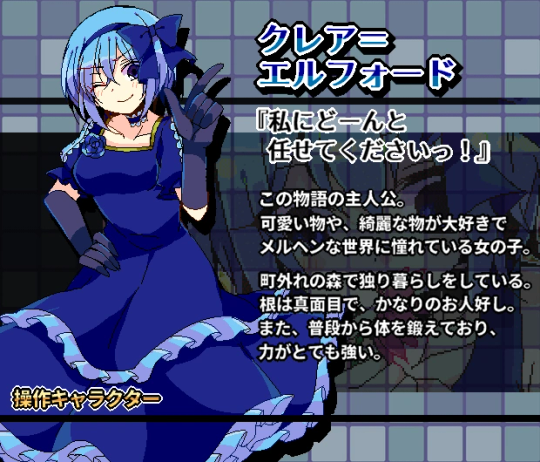
Claire Elford
"I'll take care of it!"
The main character of this story.
She loves pretty and beautiful things,
and longs to live in a fairy tale world.
She lives alone in the forest on the outskirts of town.
She is earnest at heart and quite good-natured.
She also works out on a regular basis and is extremely strong.
and I'll include the Japanese text as well, because there's no reason not to. The golden text [ 操作キャラクター ] is just [ character ].
クレア
エルフォード
『私にどーんと
任せてくださいっ!』
この物語の主人公。
可愛い物や、綺麗な物が大好きで
メルヘンな世界に憧れている女の子。
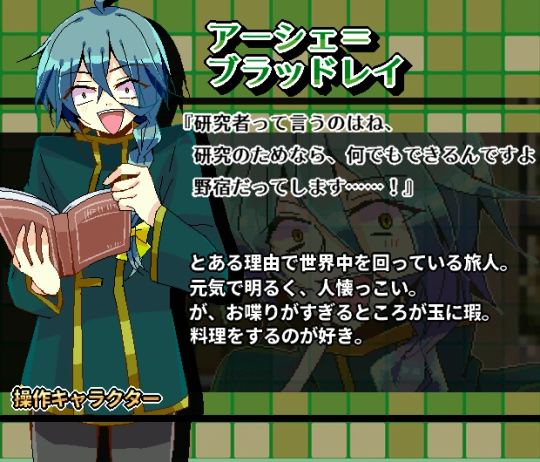
町外れの森で独り暮らしをしている。
根は真面目で、かなりのお人好し。
■また、普段から体を鍛えており、
力がとても強い。
Ashe Bradley
"You know what they say about researchers.
I can do anything for the sake of research.
I can even camp in the wild…………….!"
A man who travels around the world for one reason or another.
He is energetic, cheerful, and friendly.
However, he is a bit too talkative.
He likes to cook.
アーシェ
ブラッドレイ
『研究者って言うのはね、
研究のためなら、何でもできるんですよ
野宿だってします……………!』
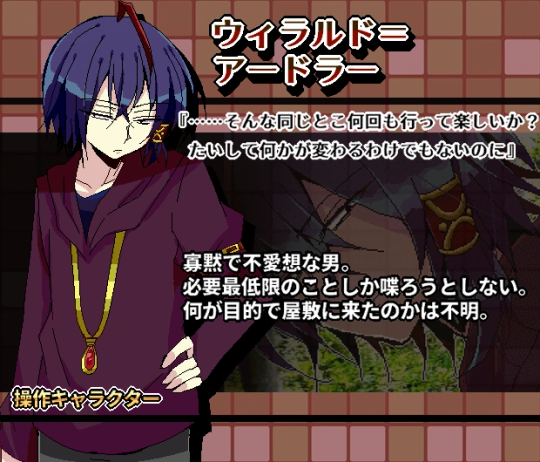
とある理由で世界中を回っている旅人。
元気で明るく、人懐っこい。
が、お喋りがすぎるところが玉に瑕。
料理をするのが好き。
Wilardo Adler
"How much fun is it to go to the same place over and over again?
It doesn't change."
A taciturn, unsociable man.
He only speaks the bare minimum.
It is unclear why he came to the mansion.
ウィラルド
アードラー
そんな同じとこ何回も行って楽しいか?
たいして何かが変わるわけでもないのに』
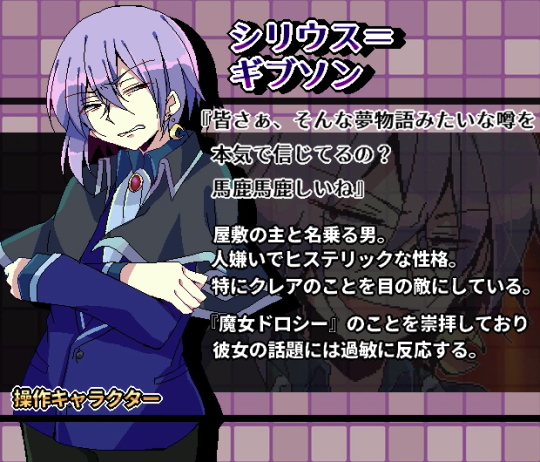
寡黙で不愛想な男。
必要最低限のことしか喋ろうとしない。
何が目的で屋敷に来たのかは不明。
Sirius Gibson
"Do you people really believe those fantastical rumors?
They're absolutely ridiculous."
A man who claims to be the owner of the mansion.
He is misanthropic and hysterical.
He is especially hostile to Claire.
He reveres "The Witch Dorothy",
and is sensitive to any mention of her.
シリウス
ギブソン
『皆さぁ、そんな夢物語みたいな噂を
本気で信じてるの?
馬鹿馬鹿しいね』
屋敷の主と名���る男。
人嫌いでヒステリックな性格。
特にクレアのことを目の敵にしている。
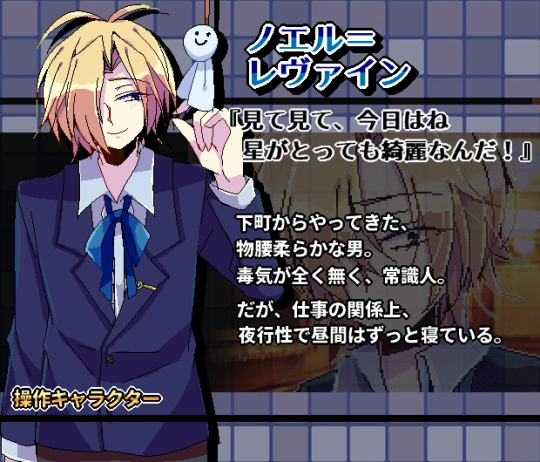
『魔女ドロシー』のことを崇拝しており
彼女の話題には過敏に反応する。
Noel Levine
"Look, look.
The stars are so beautiful tonight!"
A soft-spoken man from downtown.
He is a sensible man with no venom in his voice.
However, due to his work, he is nocturnal and sleeps all day long.
ノエル
レヴァイン
「見て見て、今日はね
星がとっても綺麗なんだ!』
[ Obsessed with Noel being from downtown... And Sirius' hysteria ]
下町からやってきた、
物腰柔らかな男。
毒気が全く無く、常識人。
だが、仕事の関係上、
夜行性で昼間はずっと寝ている。
#witchs heart#witch's heart#claire elford#ashe bradley#wilardo adler#sirius gibson#noel levine#illym translation
34 notes
·
View notes
